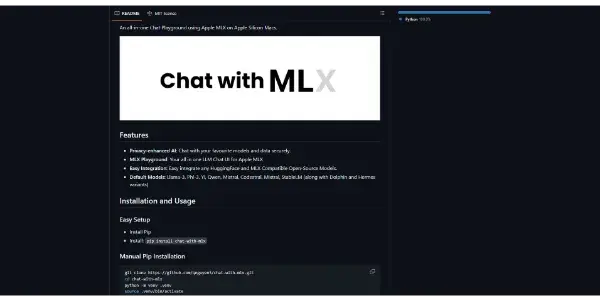Chat with MLX

Discuss your documents securely via an all-in-one interface compatible with many open-source LLM templates. Powered by Apple MLX framework
Chat with MLX: A Secure, Open-Source LLM Interface
Chat with MLX is a novel AI tool designed for secure and efficient document discussion using large language models (LLMs). Powered by the Apple MLX framework, it provides an all-in-one interface compatible with numerous open-source LLM templates, offering a streamlined experience for users needing to interact with their documents via AI. This article explores its functionality, benefits, applications, and competitive landscape.
What Chat with MLX Does
Chat with MLX acts as a bridge between users and their documents, leveraging the power of LLMs to facilitate interaction and analysis. Instead of navigating multiple platforms or wrestling with complex command lines, users can upload documents and engage in a natural language conversation with the AI. The AI then processes the document content and responds to queries, summaries, or other requests based on the selected LLM and its capabilities. The key here is the secure aspect – the processing happens within a controlled environment, prioritizing data privacy.
Main Features and Benefits
- Secure Document Handling: Chat with MLX prioritizes data security by processing documents within a confined environment, minimizing risks associated with external API calls or cloud-based processing. This is a significant advantage for sensitive information.
- Open-Source LLM Compatibility: The tool supports a range of open-source LLMs, offering flexibility and customization. Users aren't locked into a single model; they can choose the one best suited for their needs and expertise.
- All-in-One Interface: Instead of juggling different tools and platforms, Chat with MLX offers a centralized, user-friendly interface for document upload, LLM selection, interaction, and output retrieval.
- Efficient Document Analysis: LLMs can quickly process and analyze large volumes of text, enabling users to extract key information, summarize lengthy documents, or answer specific questions efficiently.
- Apple MLX Framework: Utilizing the Apple MLX framework ensures performance and stability, leveraging Apple's optimized machine learning infrastructure.
Use Cases and Applications
Chat with MLX finds applications across various fields:
- Legal Professionals: Reviewing contracts, analyzing case law, and summarizing legal documents.
- Researchers: Extracting relevant information from research papers, summarizing findings, and generating literature reviews.
- Financial Analysts: Processing financial reports, identifying trends, and summarizing key performance indicators.
- Educators: Analyzing student submissions, providing feedback, and generating summaries of large amounts of student work.
- Business Professionals: Summarizing reports, extracting key information from emails, and automating report generation.
Comparison to Similar Tools
While many tools offer LLM-based document processing, Chat with MLX distinguishes itself through its emphasis on security and open-source compatibility. Other platforms often rely on proprietary models and cloud-based processing, potentially raising concerns about data privacy and vendor lock-in. Chat with MLX addresses these concerns directly. A direct comparison with specific competitors would require knowing which tools are being compared against.
Pricing Information
Chat with MLX is currently offered free of charge. However, future pricing models are not ruled out, possibly including options for premium features or enhanced support.
Conclusion
Chat with MLX offers a compelling solution for users seeking a secure and flexible method for interacting with documents via LLMs. Its focus on security, open-source compatibility, and user-friendly interface positions it as a valuable tool across a wide range of applications. As the LLM landscape continues to evolve, Chat with MLX's adaptability and commitment to user privacy will likely ensure its continued relevance.